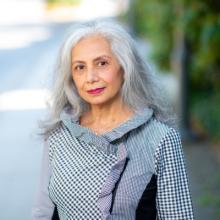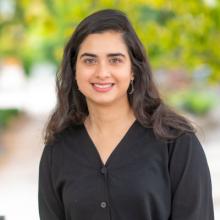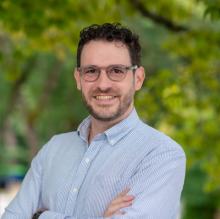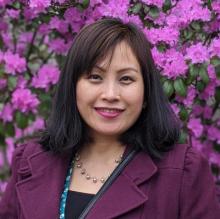2017-18 PSI Scholar Andrea Johnson was a clinician in pediatric oncology at BC Children's Hospital for over 10 years. "I hadn't planned to do a PhD or pursuing post-secondary academic research." But that changed when she found that many adolescents were coping much worse as cancer survivors than they were when diagnosed with cancer.
“I really couldn't make sense of that in terms of what was happening to these young people. They were experiencing more depression, more anxiety, seemingly more suicidal thinking after they survived treatment for cancer,” said Andrea, now a doctoral student in the School of Social Work. “So, I decided I needed to do some research to figure out what was happening with this group of young people.”
According to Andrea, little research is done on what life is like for adolescents zero to 12 months after they finish treatment for cancer. This is an opportunity to apply a unique lens on the experiences of adolescents diagnosed with cancer. “We know very little about the experience of an adolescent. It's only been, probably in the past couple of decades, that we recognize that they're a unique group of patients.”
Andrea wants to inspire clinicians to be cognizant of the post-treatment period of time. She hopes for a paradigm shift, where healthcare professionals will begin to consider post-treatment as an essential period of intervention for this potentially vulnerable group of young people.
Research Description
Most adolescents survive a diagnosis of cancer. However, the success of current cancer treatments has created a posttreatment population of adolescents who appear to have unique medical and psychosocial needs. There is growing scholarship in the area of adolescent cancer survivorship as both their long-term medical outcomes and psychosocial experiences are becoming better understood. However, little is known about the experiences of specifically adolescents within early survivorship (0-18 months following treatment completion). What is known from the limited studies that do exist is that adolescents experience significant rates of psychological and posttraumatic distress early on following treatment completion. They are also at increased risk for suicidal behaviors. It is unknown why. My research will explore these early posttreatment experiences of adolescents who have completed treatment for cancer. With these findings, using an arts-based method, I will also work with adolescents to develop knowledge-translation strategies for clinical practice settings.
What does being a Public Scholar mean to you?
I am so honoured to be a UBC public scholar. I entered my PhD program to better understand the experiences of a vulnerable group of patients and ultimately to contribute to enhancing their psychosocial wellbeing. Being a public scholar reminds me of this commitment and its necessary value. Moving research into the public realm and using what has been learned to impact social wellbeing and growth is why I pursued doctoral research.
In what ways do you think the PhD experience can be re-imagined with the Public Scholars Initiative?
What I love about the PSI program is the intentional value and commitment of linking researchers and their work to the public interest and realm. The PSI program helps shift the understanding of PhD research as having limited social impact. With the focus on moving academic research from academic to public spaces, the PSI supports the belief that PhD research conducted with the public, or larger society in mind, has meaning and potential for impact.
How do you envision connecting your PhD work with broader career possibilities?
I think the direct involvement of patients within research activities will continue to grow within health care research. I also believe that the experiences of adolescents will receive increasing attention by both researchers and the clinicians who care for them. I hope that my PhD work continues to support and reinforce adolescent voice in research activities and that I will have a role within this work.
How does your research engage with the larger community and social partners?
Historically, adolescents have not been included in research inquiry. My research directly involves adolescents themselves and provides them space to discuss their experiences throughout the cancer trajectory. Adolescents will also be engaged as co-researchers within the development of knowledge translation. They will be partners within the dissemination of findings. Direct involvement of patients into research activities is increasingly being valued within health research. This remains a priority of my research.
Why did you decide to pursue a graduate degree?
Early into my career, I hadn’t planned on pursuing a PhD. I was an established clinician in health care and loved being a front-line clinician. However, as I began to be confronted by both the unique needs of adolescents diagnosed with cancer and the current gaps in literature and practice, I knew that I wanted to add to the scholarship that would hopefully impact their quality of life and psychosocial outcomes.
Why did you choose to come to British Columbia and study at UBC?
UBC is an ideal research training environment. UBC has offered me an intersection of academic scholarship and clinical translation. As a clinician pursuing PhD research training, this was important to me. This intersection has been fostered by my supervisor and I am grateful to be in an academic environment that values this overlap.
What I love about the PSI program is the intentional value and commitment of linking researchers and their work to the public interest and realm. The PSI program helps shift the understanding of PhD research as having limited social impact. With the focus on moving academic research from academic to public spaces, the PSI supports the belief that PhD research conducted with the public, or larger society in mind, has meaning and potential for impact.




